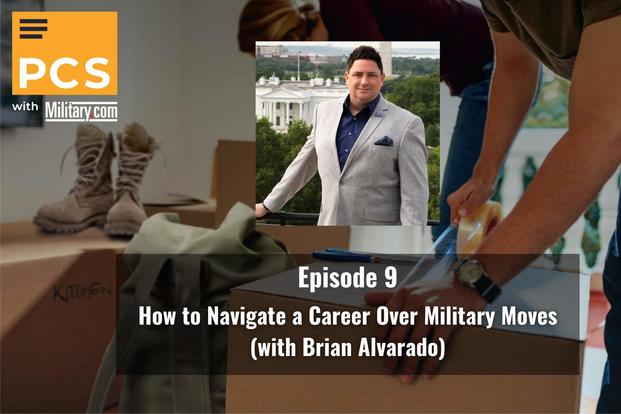After two decades, a variety of military spouse-focused nonprofits and government programs are still working to find solutions to a long-term problem: military spouse unemployment. With the spouse unemployment rate sitting at about 24%, according to the U.S. Chamber of Commerce Hiring Our Heroes Foundation, the turn to remote work during COVID and consistent employer education campaigns from military organizations are starting to help.
But military spouses continue to face issues around finding and growing careers that meet their skill sets and geographic locations. Those are the kind of challenges Brian Alvarado, who leads the Hiring Our Heroes Military Spouse Program, is trying to solve. In today’s episode, Brian talks through those challenges and ways military spouses can navigate employment issues during and around a military PCS.
Follow and Subscribe to the PCS with Military.com Podcast
iTunes | Google Podcasts | Spotify | TuneIn
Connect with this episode:
Get military PCS advice in your inbox
Learn more about military PCSing
Learn about the Hiring Our Heroes Military Spouse Program
Learn about the Amplify program
The following is an edited transcript of this episode of PCS with Military.com.
Amy Bushatz: A military PCS is often a good thing for a service member's career. It means broadening opportunities, career progression, new challenges, a change of scenery, a new change of command, a chance for additional education and so much more. But rare is the day that a PCS is a good thing for a military spouse's career.
For many spouses, it means leaving a job, risking career progression, huge stress as you attempt to negotiate remote work. And for those holding professional licenses, a long journey to figure out how to get licensed in a new state or locality. In short, it's not great. I know that all too well, myself. While I was fortunate to be hired for remote work here at military.com not very long into my military marriage. It wasn't until after I had to abandon a promising journalism career in Washington, D.C., given up on finding new work at our duty station and started working both odd admin jobs and at the coffee shop that I found my new job. The struggle I know is real.
Fortunately, there are organizations out there working to help with this problem, including a military spouse focused program attached to the U.S. Chamber of Commerce's Hiring Our Heroes effort. Through career assistance workshops, known as Amplify, to local networking groups throughout the world, research assisting national level policy decisions, and even fellowships in education help, the Hiring Our Heroes Military Spouse Program is doing some hard and awesome work.
And that's why today I am so pleased to welcome Brian Alvarado, the lead of that program, a good friend of mine, the spouse of a recently retired sailor and a wonderful human being. Brian is going to give us his best insight on how spouses can grow and keep a career despite all those military moves. Brian, welcome to PCS with Military.com
Brian Alvarado: Thank you Amy, it is a pleasure to be here and to have this time with you.
Amy Bushatz: Yes, I am so excited, first of all, just for a excuse to talk with you, cause I don't get to do that nearly often enough.
And because we get to share your awesome and really broad expertise in this subject and the expertise of the Hiring Our Heroes program with military spouses and our listeners.
Brian Alvarado: Well, I'm excited to have this conversation with you. I know that you and I have shared this work in this space for a long time in conversations about how we can improve and create more opportunities for military spouses while breaking down barriers. And we're still here doing this work and still talking about it, which means we've got a long way to go, but, we have to keep having these conversations and keep talking about it and building, and I'm excited to do that.
Amy Bushatz: When you say we've been doing this for a long time, you make us both sound old. I want you to know that.
Brian Alvarado: I think that's okay. I think that a little middle age and a little wisdom are great.
Amy Bushatz: Okay. Fair enough. All right. Speaking of age and wisdom, how many times have you moved? Both in and out of the military? What's your moving record?
Brian Alvarado: Oh my gosh, Amy. I have been, I grew up in Wyoming. I went to college in Washington. I landed in California where I met my spouse and we ended up with moving three times together. Cause we did get married later in life. We were not high school sweethearts but we did uh, PCS three times ending in a final twilight tour PCS to our nation's capital, Washington, DC back in 2019.
Amy Bushatz: And that is where you are coming to us from today.
Brian Alvarado: Yes, ma'am. My spouse works at the Pentagon and we live about three blocks from there. So, we are enjoying the east coast life now.
Amy Bushatz: Awesome. So first I need you to tell us about the Chamber program you lead, and then also how you got into that job, because it's such a great story.
Brian Alvarado: Yeah. One of the things that is really important to understand, when I said earlier that you and I have been in this work for a long time, is that the unemployment rate of military spouses sits somewhere in the range of four times that of our civilian counterparts. And when you factor in an additional 60 to 70% of the military spouses are underemployed, you really start to examine why that is, what are the challenges and what are some solutions that can come to the table. And in 2012 Hiring Our Heroes, which as you noted as a initiative of the U.S. Chamber of Commerce's foundation had been working really diligently in the veteran space to help reduce an overwhelming unemployment rate amongst our country's veterans. And as they were doing that work, they started to talk about the economic stability of the military family and the expanding need for a second income, you know, just to sort of make the ends meet, not just, stability, but putting food on the table.
And so in 2012, Hiring Our Heroes launched the Military Spouse Program, which as you stated is a multi-faceted program that is attacking military spouse challenges in employment from different perspectives, right? There's a lot of challenges that need a lot of different attention and a lot of different opportunities to create the ability for a military spouse to get and stay employed in meaningful work opportunities. And so through employer engagement, professional development, peer to peer networking, the military spouse program at Hiring Our Heroes is doing that work. And I arrived in this position because I was doing what a lot of military spouses were doing.
I would say the majority even, and that was volunteering. We are serial volunteers and I was the president of the family readiness group that was in support of my spouse's command at the time. I served three years as a US Navy ombudsman. And throughout those experiences, I was meeting and engaging with spouses who were telling me about the struggles that they're having finding employment. And I was a little bit older. I was a little bit more settled in a career. And so I started just reaching out to my network and saying, Hey, network, I have this acquaintance. She's a very bright military spouse. And she is struggling to find employment. Does anybody have anything open right now?
And lo and behold, I started sort of facilitating these conversations and that work led me to a program of Hiring Our Heroes, called the Military Spouse Professional Network, which is a network of networks around the globe led by volunteer military spouses who work to provide opportunity in the local community for that peer to peer networking, and employer engagement. And I thought, wow, this is this, there's an actual organization that's doing this. And I quickly got involved and became a volunteer and was running that network out in San Diego while my spouse was stationed there. And, upon 2019 coming, and my spouse was talking about retiring from the military and we were discussing what we wanted to do with the rest of our lives, I got a phone call. And I was offered a position on staff at HOH here in D.C., at our headquarters at the U.S. Chamber of Commerce. And so I came and I joined the program and we have grown it over the last three years to include everything from entrepreneurial resources for military spouses, to growing professional development opportunities, more employer engagement.
And now I am the director of the program and get to spend my days working in this space and leading a team of dedicated professionals who work every day, all day long to break down those barriers and to put up opportunities.
Amy Bushatz: Your story is really one of rising in an expertise in something that you're passionate about. And now you're the boss person, which is just it's, I just loved the story, Brian. And I love that, that you're in that role because it's such a good example of the trajectory that you teach in that role. It's like the whole world just came together in that one thing. It's so, it's very inspirational.
So, the military spouse career world has changed a lot since you and I started wandering around in it. As we have mentioned, we are now aged. I mean, I attended my first networking group meet up in 2012 when I was at Fort Campbell. And the program was that the networking program was known by a different name.
So there are still so many challenges though, for spouse who want to work. It hasn't, it's gotten better because of the advocacy work programs like the chamber's program do, but it's not cured as we've already mentioned. So what are the biggest challenges that you see today?
Brian Alvarado: Yeah, that's a great question. And as you mentioned, it's sort of evolving, ever evolving really. And what we're seeing today is much different than what we were seeing two years ago. And a lot of that has to do with the pandemic. And, don't get me wrong. Nobody wants a global pandemic, but there were things that we learned in the American workplace that we didn't know before we gained valuable trust in the idea behind remote work.
And so we're seeing a lot more opportunity to grow in that remote work field, which can lead to portability of jobs. But that is still the biggest challenge. The biggest challenge is that we move every 18 months to three years. And sometimes we move overseas, which creates a whole other stack of problems that have to do with the status of forces agreements in the countries where we get stationed.
So the main challenge is still that portability of careers. While it's improving, that is still the main challenge. And, to be quite frank, there is still a lot of stereotypical concepts in American business throughout the sectors. Everything from small mom and pop shops outside the gates of military basis to large companies, there are still stereotypes out there.
There are still the idea behind, you know, the value of investing in a military spouse employee versus somebody who doesn't have a built-in expiration date. And that is what I would be considered our second challenge, is always working to educate employers on the value of military spouses on the business case for hiring military spouses and really diving deep into what the difference is between the the idea behind a workforce that was from 20, 30 years ago where you started in a job and then 20, 25, 30 years later, you got a little clock with your name engraved on it. The idea behind American, our American workforce and the way that we work is much different now. And that is quite frankly, thanks to the the millennial generation who are coming in.
And they're utilizing their skillset. They're giving their skillset to a company for two to three years. They're gaining new skill sets there and then they're moving on to other companies. Well, guess what also happens in that timeframe? The military PCS moves, right? So we're seeing that people are staying in jobs less time and really digging in and giving of themselves for two to three years.
So we're working, we're using that to sort of combat that conversation in American business. So those are still the two sort of biggest challenges for our community is definitely the PCS and the constant moves and being able to have remote and portable jobs. And then still to continuously having those conversations with employers to break down the barriers.
Amy Bushatz: Right. Right. Do you find that the extent of these challenges surprises career-minded military spouses that they just didn't expect to find that these were still problems until they faced them themselves?
Brian Alvarado: You know, it's an interesting question. And one that sort of surprises me actually. And the answer is yes, it does surprise military spouses. I talk to military spouses almost on a daily basis and, you know, as they come through programs like our Amplify program and they start to of break down their own barriers and start being able to speak clearly about what their challenges are individually and what their career destination is. And a lot of them say, I had no idea that this was going to be an issue. And, you know, that's that just has to be fought. We just have to accept that and say, okay, well now we know it. What are we doing about it? And when I got married to my spouse, I didn't sit and think about the fact that you know, he was going to get orders in two years. It just didn't even cross my mind. And so I can sympathize with that.
Amy Bushatz: So, instead of just asking for blanket tips, I want to work with you to address a few very specific common challenges. Because we like to be really practical on the PCS With Military.com podcast. And I think that's the best way to tackle such a really broad issue. So first tell me, should spouses have to settle for a job or role or field they don't want just to get some employment.
What do you advise people do if they feel like they are just hitting their heads against a wall constantly on this issue?
Brian Alvarado: Yeah. That's unfortunately, there isn't a blanket response to that, right? It's going to depend on the need of the family. And what I tell military spouses all the time is, you know, you need to do what you need to do.
If your family needs you to take, you know, a job that isn't your dream job or anything near it, because you need it to work, to provide for your family, then you need to do that. But. I ask you to do, if you're in that situation is to always be striving for what is going to give you a meaningful career opportunity.
So if it's the fact that you are not in a location where that dream job or that career destination exists, then use this time, do the filler job, use time to hone in your skillsets, get some certifications, make sure that you are the gold standard candidate when you do get to where that opportunity is. But settling for a job or role, it is a deeply personal case by case situation because we, again live in a country and a society where, you know, a single family income is basically a thing of the past. Especially if you are stationed in a military metropolis, like the DC area or San Diego or Honolulu, it's quite impossible to, to survive, on a single family income.
And so that is you know, my, my advice always is to, no matter what your current situation is and what you need to be doing to always be working towards getting to where you really do want to be, and to make sure that when you get there, you are fully prepared. You have all of the network in place, you have all of the resources, you have honed in all of the skills so that when you do get to that opportunity you're ready.
Amy Bushatz: Right. Right. That's, that's great advice. So what I hear you saying is maybe don't even think about it as settling. Think about it as keeping your eye on the prize and what you want to do, but also simultaneously doing what you need to for your family.
Brian Alvarado: Absolutely.
Amy Bushatz: Okay next question. It's like a, it's like lightning style sort of here today. Okay. Is going back to school or changing careers a good idea if you're having trouble finding a job in your preferred field. And I know you and I hear this a lot that people are thinking about, going back to school or getting a different degree, or just really ripping up what they, who they thought they were going to be because they are having trouble finding employment.
So what do you suggest?
Brian Alvarado: Absolutely. And I tell every military spouse and in fact, I tell every person, I know whether you are a military spouse or not, you should be open to opportunity. And I will, I'll give you a quick example. I met a military spouse in San Antonio several years ago when we were conducting an Amplify at the USAA headquarters down there in San Antonio.
And there were some people in the room from San Antonio and somebody said, Hey, can I get a raise of hands of who wants to work at USAA? And a ton of people raised their hand and like, you ain't want to work at USAA. Great. And I was sitting up at the front and I was looking out at the crowd and there was a spouse sitting in the front row and she didn't raise her hand.
And which is fine. Not everybody wants to work in financial services or whatever the case might be. And I was interested in, the fact that she just was not hyped up at all. And so I chatted with her at lunch and she said, Brian I'm an educated, experienced scientist. And, you know, working at USAA, just wasn't, it's not what I want to do.
And I'm like, oh my goodness gracious. All right. Okay. So let's talk about that, right? Like, let's talk about what it's like to be a scientist as a military spouse. And she said, well, I'm experiencing all of the extreme challenges as every other military spouse there isn't the opportunity where we move.
And I said, okay, well, what is that like for you now? What are your priorities in life now that you have had two, two PCS seasons where you've moved, where there is an opportunity, what do you want to do? And she said, well, I really feel like I'm on the verge of having to, jump track. And I said, okay, so what does that look like for you?
And she said, I don't know, Brian, because science is the only thing I do know. And I said, okay, well, you are in an amazing position then, because you are open to everything and you are open to listening and taking opportunities. You're in a great position. And so I introduced her to the Military Spouse Fellowship Program through Hiring Our Heroes, which takes candidates and puts them in front of different companies and organizations with a ton of different opportunity and let them choose from these, this candidate pool and say, look, I would like to bring you in for a fellowship and find a place for you. And the really great part of the story is that she ended up doing a fellowship with USAA.
As she now works in data analytics for USAA and she's happier than she's ever been in her life. And that is such a just a telltale story of the experience and you're right. We have been hitting our heads up against walls. We have been having doors slammed in our faces, and now there has never been a better time to be a military spouse when it comes to employment, because there are hundreds and hundreds of companies and organizations out there through the military spouse employment partnership through the DOD, through the work of the U.S. Chamber of Commerce's Hiring Our Heroes initiatives that have stood up and said, we understand, and we want to hire military spouses and here are our opportunities. And so I tell spouses all the time, if you feel like you're tired of being told no and not finding what you're looking for, then go where the opportunity is.
Amy Bushatz: So one of the things that military spouses do to find those opportunities is advertise that they're a military spouse on LinkedIn. So there are better, there are ways to do that and ways that maybe are not so good to do that, but I'm wondering about blanket.
Is that something you advise? Should military spouses tell an potential employer that they're a military spouse at all? And second of all, is that something that you should be advertising broadly? Say, for example, in that LinkedIn profile?
Brian Alvarado: That is a great question and something that I even believe you and I have sat in a hotel one time talking about this years ago. And I believe that the answer to that question has actually changed over the years. I want to say very clearly and very pointedly that if your career has something to do with the military community, you definitely want to put the you're a military spouse.
If you are looking for an opportunity in the military service organization or veterans service organization space, definitely put that you're a military spouse because having that connection to the community really helps the hiring managers, understand that you are going to know a lot of stuff already coming into this industry, right?
So there's one piece because a lot of military spouses end up working in the MSO/VSO space. So, you know, because we start out volunteering in it, and then ended up working at fleet and family, or, you know, end up working at Hiring Our Heroes of Military.com. So that is a very clear statement.
If you are applying for blanket positions that have nothing to do with the military community, then I say, it's not necessary. And all it's ever going to do is just tie you to the experience of your, of your life and your service member's career. But it's it isn't going to help you get to your career destination, unless it's relevant. I, if I was married to an architect, I wouldn't put, oh, I'm architect, spouse on my LinkedIn. And while, if, while our scenario in our situations and the delicate issues that face our community are much different than an architect's spouse, I really truly believe that if you are looking for an independent, meaningful employment opportunity for you as a military spouse, that is you and your skillset. Now, some of the stuff that you've learned over the years as a military spouse, some of that experience that turns into skillsets can be listed, but I don't think that you necessarily have to, put on your headline that you're a military spouse.
Amy Bushatz: Right. I'm so glad this is your answer because this is the same advice I've been giving people. Continue.
Brian Alvarado: Now, there is one caveat here, and that is all of those hundreds, and hundreds, and hundreds of employers that are signed up now and they're raising their hands saying, we want to hire military spouses, they're saying, well, where are the military spouses? How do we know that they're a military spouse? So my advice to the military spouse community is that if you are applying for a position within an organization that is a part of the Military Spouse Employment Partnership or a part of the Hiring Our Heroes programming, then in your cover letter, if they ask for one, put it in there and say something about the fact that you know that they are a member of the military spouse employment partnership, and you'd like them to know that you're a military spouse.
And I think that would be an appropriate way to engage with those employers and let them know that you are a military spouse and that you appreciate what they're doing, building initiatives to hire people from our community.
Amy Bushatz: Yeah. Yeah. That's really good advice. I, you know, I give the same, you can feel free to disagree with me on this, but I often volunteer with your program Amplify , as you know, and do mentorship sessions with people who are at the program and looking for employment help. And that's a really cool opportunity, and just a plug for that, if you are a military spouse, or affiliated with the community in a professional role right now, Amplify is always looking for mentors to volunteer and you're paired with somebody who's attending this two day workshop and you have an opportunity to just to give them their best, your best advice, you know, lived experience advice, and hear what they're dealing with. And sort of just chew on their problems and brainstorm with them based off of your own experience. And it's not necessarily somebody who's in the same career field that you are, but it's, I've really enjoyed that opportunity.
One of the things I do before that is I check out their LinkedIn profile and every now and then someone will have how many children they have in their professional, LinkedIn profile. And I suggest that they not do that because it's not relevant to their - unless it is relevant- but more often than not, it's not relevant to the job that they're looking for.
And if anything, it's creating an unnecessary and completely untrue stereotype about parents. Your employer has no business knowing if you are a parent or not, again, unless it's relevant and or something that you want to share in an interview, but it shouldn't be a gatekeeping thing. And I think that's very similar to this subject. As you said, why would your employer need to know you're married to an architect? They don't, unless it's relevant, which I guess it could be. So same thingI, am I, am I giving back people bad advice with the mom thing or the parenthood, by the way?
Brian Alvarado: No, absolutely not. It's funny in Amplify when we're, when we're teaching public and professional speaking, we're teaching the elevator pitch. I actually use an example where it's appropriate to say that, because the military spouse in this particular case is a pediatric nurse. Right. And so it's relevant for her to say, you know, I love working with my three children and all the children around in the community, you know, that sort of thing. So it's relevant there, but that would be one of the few cases where I would mention your children.
Amy Bushatz: Right. Exactly. Exactly. Okay, good. It's always nice in these podcast episodes to hear that I'm not totally off base either. I appreciate that. Okay. So good. Ooh.
So, talk to us about these career gaps. You sort of mentioned integrating your military spouse experience into your resume if that's appropriate, but one of the ways people, one of the reasons people do that is often to sort of fill in the blank, pad around the inevitable career gaps. I mentioned earlier that when I married a soldier, I moved away from Washington DC and left my job and had employment completely unrelated to what I do now. I had a career gap. I chose not to fill that in on my resume, I chose just to leave it. And if anyone asks, say, you know what, I moved across the country and I got married and I was having trouble finding a job in journalism, just like every other journalist on the planet. That was a very common problem at the time. So I felt comfortable doing that, but not every career is like that.
So what do you suggest people do for these career gaps? Do they explain them at all? Did I put in the volunteer stuff? What should they do?
Brian Alvarado: Absolutely. You know this again, just like some of the other points in our conversation, Amy today is a topic that is ever-changing. And one of the things that's really interesting about what's happening right now is as we are answering this question for military spouses, we are also educating employers.
And we're talking to employers about how to translate the resume of a military spouse. We talk about translating skills for the service members. Well, the same can apply for military spouses and what that conversation looks like on both ends is let's concentrate on what the skill set is that the military spouse has.
How does it align with a skillset that is needed for any given position and how those two things can come together and that military spouse can give you what you need in that position and thrive. Because the fact of the matter is it is more important to me to talk about what you can bring to the table today than it is what you did between 1999 and 2001.
So. While you may have had a gap in in your career. I don't care about that. I care about what you can bring to the table today, you know, and a lot of this is growing across the nation. You're seeing more and more the you know, in job descriptions on LinkedIn or, or, career sites within organizations, you're seeing a heavy, heavy emphasis on the skillset.
And making sure that if you are applying for a job, your resume needs to mirror the skill sets that are on the job description, or you can easily be kicked out of the ATS systems, which are those automated systems that that read resumes or hiring managers are just doing the flip, they're taking two to three seconds on that resume.
And if they don't see the skills that they need pop out right away, right at the very top there, you're going to the no pile. And so it's becoming less important for us to have to explain career gaps. Right. And, And this is also something that's multifaceted, right? One it's because of the dire need for skilled employees in America, we're down 10 million jobs right now.
And so like, people are desperate for workforce skilled, talented, dedicated loyal employees. And that is that's my description of military spouses. So if you want to workforce solution, don't worry about what that spouse did five years ago for nine months when they were unemployed and worry about what they can bring to the table today.
And as a military spouse learn how to communicate that, learn how to turn that question into a half a second answer. And then you are owning the conversation and bringing it back to the skill sets that you bring to the table today.
Amy Bushatz: So that's a great segue because I was just about to ask you what your favorite resources are for helping military spouses gain and keep a career during the course of military life. Part of that is learning the thing you just said. So what are the resources, what are your favorites?
Brian Alvarado: Well, I think the main resource for me and for what I believe in wholeheartedly is absolute mentorship. I believe every person should have an active mentor and an advocate, no matter where they're at.
And those could be two different people. And can be any length of a relationship. A mentor can be something that's short term through what you were describing at our Amplify program, where it's just an hour long conversation, to other programs that maybe last a year, or maybe it's not tied to a program at all.
Like my mentor who is just somebody who I used to work for and it has continued to be my mentor in life. And that is I think the most important piece of anybody as a resource in, in, in your career and in, in life. Now, when you want to talk about specific things that were, they can look up on the internet or attend something I'm going to be very biased and say that the Hiring Our Heroes Amplify program is where you can have the opportunity to invest in yourself and to walk away with an experience that's going to help you develop the path to that career destination and get you there, and cross the finish line. And learning how to effectively communicate that career destination and why you're the right person for that job is the very first session in Amplify where we break down those barriers. Because we can go and stand on the rooftop or on a mountaintop and scream to the world, what our service member spouse does, but when asked what we do or what we want to do, the majority of us cower away, or we mumble and say, well, I don't really know. You know, I haven't really thought about it or I, you know, I don't, I, you know, I focus on this or I focus on that. This program helps you clearly identify that path and then learn how to effectively communicate it. So if you're interested in that our website is Hiringourheroes.org. You can find information, we offer it virtually and in and around defense communities around the country all year long. So check that out. I think it's a tremendous resource and a lot of really dedicated people that put it on.
Amy Bushatz: Yeah. Yeah. And I'm a little biased for Amplify, too. I'm not going to lie, not just because I volunteer, but because I think I attended the very first one.
Brian Alvarado: Well, you and I both did. We both attended that very first one.
But you know, one of the things I'd like to mention and I think this is really important as a resource, but it's a resource that we build our on our own, and that is our network. And the ability to have any effective network that works for you and for those around you is really important and truly understands that networking is a lifelong initiative. It's not about what you need today. It has to be something that is massaged and utilized and participated in on a constant basis. And it needs to be diverse. It needs to be open. It needs to be deep. Like these things are important in order for a, an individual to really be able to rely on their network when they do need something. And it's a two-way street, you need to be participating as a giver in that as well. So I just really think that's an important piece of the conversation when talking about resources for military spouses or anybody, when you're talking about your career is that resource that you build of your own, and that's your now.
Amy Bushatz: Yeah. Yeah, no, and that's such, that's such great advice. I know you and I are both personally big believers and users of that as well. And I think we've had conversations about that that too. So, uh, lots of, lots of uh, tableside, hotel food discussions, hypothesizing, and thinking about military spouse employment, you and I. So I value you and Brian, as you know.
Brian Alvarado: The feeling is very mutual. As you know.
Amy Bushatz: Brian, thank you so much for joining us on PCS with Military.com, and sharing all of this wealth of information with our audience. Hopefully people can take it, use it and make their military spouse career lives a little bit better as a result.
Brian Alvarado: Well, thank you for having me, Amy, and thank you for all of the support that you give our community. It is invaluable and we appreciate you so much.














